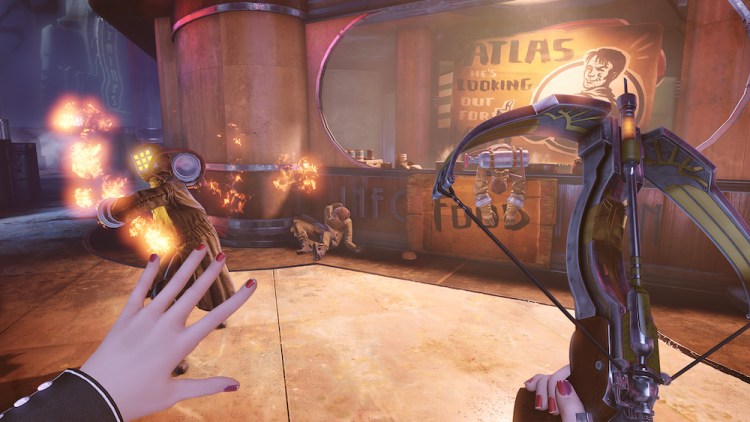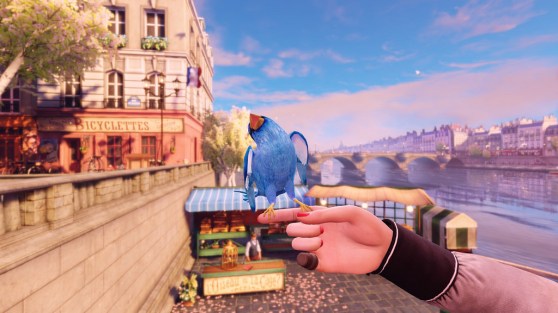Songbird is really a different version of Booker
When imaginary Booker asks Elizabeth if Songbird is human, she responds, “Does it matter?” In the overall plot? No, not really. But for those of us who simply want to know more about Fink’s weird creation, the answer is a resounding “Yes!” Episode Two adds far more questions than answers about Elizabeth’s loyal guardian. And people have already started filling in the gaps with their own thoughts.
Frustrated by the lack of details about Songbird’s origin, NeoGAF forum goer A-V-B wrote:
“And [Irrational Games] kept trying to make this Big Daddy/Little Sister connection, right? Of course Songbird is some kind of mutated, lobotomized Booker that Fink stole from another universe! IT’S OK TO ADMIT IT! IT’S TRAGIC AND NATURAL! REVEAL IT ALREADY AND MAKE IT COOL!”
Just for fun, let’s imagine if A-V-B is actually right, and Fink somehow pulled in another universe’s Booker to use as his guinea pig. Unlike Suchong and his failure at imprinting the Big Daddies on the Little Sisters, Fink was able to make Songbird form a bond with Elizabeth when she was still small, helping the wounded creature when it was hurt. But what if the reason Songbird immediately attached itself to her isn’t just because of her kindness, but also because somewhere in the beast is a piece of Booker that recognizes his daughter?
This would explain why Songbird is so protective of her. And remember when Elizabeth kills it by opening a tear into Rapture, drowning the creature while telling it to stay calm? That scene would take on a much darker meaning if a different Booker was the man (or brain) behind the mask.
Booker and Elizabeth are still together … somewhere
Understandably, a few folks found the ending too depressing when it killed off the only other character left from BioShock Infinite. I saw multiple commenters saying they prefer to believe that Booker and Elizabeth are still together in another universe. The main piece of evidence people bring up for this is Infinite’s ambiguous post-credits scene, where Booker wakes up in his office and checks to see if Anna is in her crib, but the screen cuts to black before we can see if she’s actually there. If you’re feeling optimistic, you could interpret it as Booker surviving the aftermath of Columbia and finally being able to raise his daughter in peace.
Another interesting idea is Elizabeth’s reconstruction of Paris as a kind of heaven. On the Irrational Games forums, that’s the type of ending fountaincap wish they saw in Burial at Sea. They write: “With both [Booker and Elizabeth] dead, it’s still a dark-enough ending, but I don’t think it would have killed Irrational to include a short scene showing that Booker and Elizabeth are at least happy and have reconciled in that Paris-Heaven place. That’s what was missing from the ending — some sort of resolution to the Booker-Elizabeth/father-daughter conflict.”
Others, like Raj Sound, took this one step further and wrote their own sentimental ending based on this premise of Booker and Elizabeth reuniting in Paris.
It could work on some level. The Paris that we find Elizabeth in after her death in Episode One and before her resurrection in Episode Two could serve as some form of afterlife, or at least her idea of an afterlife where birds are singing and everyone knows her name. We don’t know the extent of her powers, so she could’ve gone back to that place after dying in Rapture, and through the magic of BioShock’s multiverse, somehow bring the last Booker with her, too.
These are just a few of the explanations people have come up with, but BioShock’s complicated narrative has room for plenty more. How did you feel about Burial at Sea’s ending? What do you think happened? Tell us your best theories in the comments below. Maybe someday we’ll actually figure these games out.
VentureBeat's mission is to be a digital town square for technical decision-makers to gain knowledge about transformative enterprise technology and transact. Learn More





![Reblog this post [with Zemanta]](http://img.zemanta.com/reblog_e.png?x-id=9e243bab-d6cf-4e50-924c-48410264a56d)
